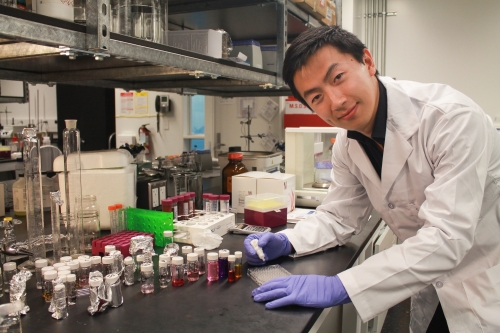Drug-infused nanoparticle is right for sore eyes

The eye drops progressively deliver the right amount of drug-infused nanoparticles to the surface of the eyeball over a period of five days before the body absorbs them. One weekly dose replaces 15 or more to treat the pain and irritation of dry eyes.
The nanoparticles, about 1/1000th the width of a human hair, stick harmlessly to the eye’s surface and use only five per cent of the drug normally required.
“You can’t tell the difference between these nanoparticle eye drops and water,” said Shengyan (Sandy) Liu, a PhD candidate at Waterloo's Faculty of Engineering, who led the team of researchers from the Department of Chemical Engineering and the Centre for Contact Lens Research. “There’s no irritation to the eye.”
Dry eye syndrome is a more common ailment for people over the age of 50 and may eventually lead to eye damage. More than six per cent of people in the U.S. have it. Currently, patients must frequently apply the medicine three times a day because of the eye’s ability to self-cleanse—a process that washes away 95 per cent of the drug.
“I knew that if we focused on infusing biocompatible nanoparticles with Cyclosporine A, the drug in the eye drops, and make them stick to the eyeball without irritation for longer periods of time, it would also save patients time and reduce the possibility of toxic exposure due to excessive use of eye drops,” said Liu.
The research team is now focusing on preparing the nanoparticle eye drops for clinical trials with the hope that this nanoparticle therapy could reach the shelves of drugstores within five years.
Liu’s research article, co-authored by eight others including Professors Frank Gu and Lyndon Jones from Waterloo, recently appeared in Nano Research, the leading publication on nanotechnology and nanoscience. The Natural Sciences and Engineering Research Council of Canada (NSERC) and 20/20: Ophthalmic Materials Network supported the research.
About the University of Waterloo
In just half a century, the University of Waterloo, located at the heart of Canada's technology hub, has become one of Canada's leading comprehensive universities with 35,000 full- and part-time students in undergraduate and graduate programs. Waterloo, as home to the world's largest post-secondary co-operative education program, embraces its connections to the world and encourages enterprising partnerships in learning, research and discovery. In the next decade, the university is committed to building a better future for Canada and the world by championing innovation and collaboration to create solutions relevant to the needs of today and tomorrow. For more information about Waterloo, please visit www.uwaterloo.ca.
Media Contact
Pamela Smyth
University of Waterloo
519-888-4777
psmyth@uwaterloo.ca
www.uwaterloo.ca/news
@UWaterlooNews
Attention broadcasters: Waterloo has facilities to provide broadcast quality audio and video feeds with a double-ender studio. Please contact us for more information.
Media Contact
All latest news from the category: Health and Medicine
This subject area encompasses research and studies in the field of human medicine.
Among the wide-ranging list of topics covered here are anesthesiology, anatomy, surgery, human genetics, hygiene and environmental medicine, internal medicine, neurology, pharmacology, physiology, urology and dental medicine.
Newest articles

Sea slugs inspire highly stretchable biomedical sensor
USC Viterbi School of Engineering researcher Hangbo Zhao presents findings on highly stretchable and customizable microneedles for application in fields including neuroscience, tissue engineering, and wearable bioelectronics. The revolution in…

Twisting and binding matter waves with photons in a cavity
Precisely measuring the energy states of individual atoms has been a historical challenge for physicists due to atomic recoil. When an atom interacts with a photon, the atom “recoils” in…

Nanotubes, nanoparticles, and antibodies detect tiny amounts of fentanyl
New sensor is six orders of magnitude more sensitive than the next best thing. A research team at Pitt led by Alexander Star, a chemistry professor in the Kenneth P. Dietrich…





















